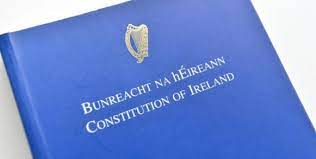Cothrom na Féinne!
I was eating my lunch alone, upstairs in the furniture store 'Meubles' when I recognized my old friend Séimí in the buffet queue. I waved my hand at him to get his attention and he gave me a big smile before coming in my direction.
"Nice to meet you here, Michael!" said Séimí as he sat in front of me at the table. "I didn't know you liked the 'Meubles' restaurant, son!"
“I love the clam chowder here. But I was the one who was surprised, because I'm always here, and I've never seen you here before, Séimí!" I said.
"I'm late today, Michael, but I come here once or twice a week at noon and I'm gone within half an hour!"
"Call me from now on if you want my company, and I'll be happy to meet you at noon," I said matter-of-factly.
"Thank you, and if I'm not in a hurry I'll call you!" answered Séimí. "But what about the 'fairness' that was established in this country after the 'Easter Rising, 1916'? Do you have any opinion on it now, Michael?” As usual for my friend Séimí an Droichid, he tilted his head as he scrutinized me.
"Share your own views with me first, Séimí!" I said, "and then I will add them." I drank a cup of coffee, while I waited for what he would have to say.
“As you well know, I have a liberal attitude. Once, my views were not accepted and people labeled me a hippie. But now we have a liberal, progressive country, almost free from the yoke of the Church at last. When it was drawn up in 1934-1937, the constitution was strongly in line with the teachings of the Church, and particularly with the views of Father McQuaid (then president of Blackrock College, and later Archbishop and Primate of All Ireland) and the Jesuit Father Cahill. The three of them (deValera, McQuaid and Cathill) were conservative Catholics, who worked hand in hand to draft the constitution. It is not surprising then, that they intended to have a religious and conservative constitution. Unfortunately, it was also a discriminatory constitution because fairness was not given priority in the constitution. There have been 38 referendums on amendments to the constitution since 1937 and the constitution we have now is completely different and better than the first one. But we still have work to do!” Séimí finally stopped talking, and started eating his assorted salads.
"I agree with you, my friend," I said. "It is a great pity that deValera was not more objective about the constitution, but he was under pressure from all sides at the time. The Catholic Church was very powerful, as the majority of the population at the time were devout Catholics. Although there were not many Protestants in the south, there were many in the North, and deValera wanted to create a constitution that would be suitable for them as well. It was difficult for him to serve both sets of needs, however, and although he made peaceful gestures in the constitution for the Protestants, deValera was subject to the Catholic Church, and that is evident in the constitution he published in 1937."
"For the first time ever, we're not arguing with each other Michael!" said Séimí, laughing. “There are now major changes in the constitution regarding divorce, abortion and same-sex marriage that would have been unthinkable thirty years ago. But are we done yet?”
"Not really, as we said!" I said. "We have and will always have work to do. But although we still have a lot to do, the most important thing for us to do right now is to remove the reference to women being enslaved at home from the constitution. We will have a referendum on that later and I hope that amendment will be accepted!”
"Of course, Michael!" said Séimí. "Ireland is now a post-Catholic country, and it's time to put an end to the oppression and restrictions of the church."
“On that note, Séimí, let's end our sessions today! We don't always agree, but we agree on the most important things, in my opinion – things like equality in this great country.”
We walked out together, and I promised myself that I would be in touch with Séimí again before long.






